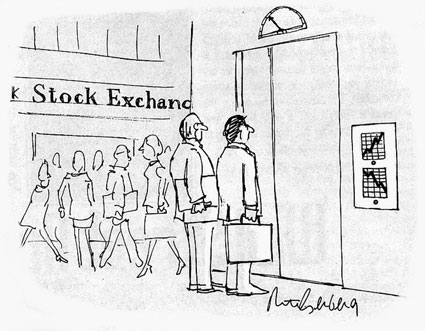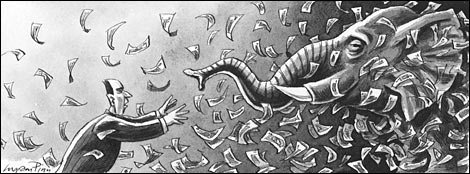Re Ian Bremmer 'Could third-party candidates upend the 2024 US election?' 3 April The current political movement in the USA…
Fears of global recession: stock indexes fall
Written by Diana Thebaud Nicholson // January 22, 2008 // Economy, Emerging markets/economies, Global Markets, Public Policy // 1 Comment

With thanks to the Huffington Post
The financial turmoil is like an elephant in a dark room
By Martin Wolf, Financial Times
Global macroeconomic imbalances played a huge part in driving monetary policy decisions. These, in turn, led to house-price bubbles and huge financial excesses, particularly in securitised assets. Now policymakers are forced to deal with today’s symptoms as best they can. But they must also tackle the underlying causes if further huge disturbances are not to come along.

January 24
House leadership, WH broker tax
By: Martin Kady II
Now that House Speaker Nancy Pelosi has taken a risk and cut an uncomfortable deal with Republicans on an economic stimulus package, it’s up to Senate leaders to figure out whether to go gently along or create havoc by loading up the delicately negotiated deal with more spending.
It would break tradition if the filibuster-prone Senate were to give the House a free pass on the $150 billion package.
So it should come as no surprise that even as details of the economic deal were leaking out Thursday, senators were already lining up to add items that had been sacrificed by Pelosi in the name of bipartisan negotiations. More
Bloomberg pans economic stimulus package
THE ASSOCIATED PRESS
WASHINGTON – New York Mayor Michael Bloomberg said yesterday the White House and Congress are negotiating a shortsighted economic stimulus package and should focus instead on encouraging immigration and helping strapped homeowners.
“We can’t borrow our way out of this. The jig is up,” Bloomberg said during a speech to the U.S. Conference of Mayors, which honored his environmental efforts.
January 23
North American stock markets turn negative again
Canwest News Service
OTTAWA – North American stock markets continued to languish in the red on Wednesday, despite a big recovery in Canadian stocks and limited losses in the United States the previous day.
Wednesday’s declines come after interest rate cuts on both side of the border on Tuesday appeared to initially ease investors’ concerns over the impact of a slumping U.S. economy.
The U.S. Federal Reserve surprised the markets with a 75-basis- point rate cut. That was followed by the Bank of Canada’s 25-basis cut to its key lending rate – with Canada’s major banks following suit. More
(Bloomberg) — Asian stocks rebounded after the U.S. Federal Reserve’s surprise interest-rate cut boosted banks and higher metals prices lifted miners.
Commonwealth Bank of Australia jumped the most in a decade and BHP Billiton Ltd., the world’s largest mining company, soared the most in 20 years. Toyota Motor Corp. and LG.Philips LCD Co. led gains among companies that rely on U.S. sales. Asia’s benchmark yesterday completed its worst two-day drop in almost 18 years on concern the global economy is slowing.
January 22, 2008
Fears of U.S. recession drive selloff. ‘It’s crazy, wild’
DON MACDONALD, The Gazette
It just keeps getting worse.
Another day of harrowing stock-market losses in Toronto and around the world yesterday had investors asking: When will the pain stop?
The prospect of a recession in the United States sent the S&P/TSX composite index spiralling down 605 points, or 4.75 per cent, after European and high-flying Asian markets plunged on fears the global economy can’t resist troubles in the United States.
The bucks stops … well, somewhere
White House press secretary Dana Perino, asked today whether the president regrets not having backed an economic stimulus package sooner: “Well, the president’s advisors advised him along the way; they’d get all sorts of incoming economic data, and at the appropriate time, they told the president that was when action needed to be taken, and the president wasted no time in saying, ‘Well then, let’s move forward.'”
Stimulus fever hits Capitol Hill
Anxiety over global financial markets Tuesday pushed lawmakers from both parties into a mad rush to hash out a stimulus package. But don’t think this brief shining moment of bipartisanship will last — partisan warfare will soon return as Congress struggles to address much more complex problems of housing, free trade and taxes.
World Markets Plunge on Fears of U.S. Slowdown
FRANKFURT — Fears that the United States may be in a recession reverberated around the world on Monday, sending stock markets from Mumbai to Frankfurt into a tailspin and puncturing the hopes of many investors that Europe and Asia would be able to sidestep an American downturn.
Until now, overseas markets had largely avoided the sell-off that has caused steep declines recently in the United States, whose markets were closed in observance of Martin Luther King’s Birthday. But investors reacted with what many analysts described as panic to the multiplying signs of weakness in the American economy.
To Some, the Widening Crisis Seems Driven by Fear, Not Facts
The fear is spreading.
For months now, investors have been lured to overseas markets with the promise that surging growth and solid economic fundamentals in Asia and the Middle East would insulate them from the credit squeeze plaguing the United States market.
But the broad international sell-off on Monday — and the prospect of a steep market decline in the United States on Tuesday — raised fresh concerns that a looming recession and the fallout from subprime mortgages could have global repercussions.
Some analysts saw the sell-off, with leading indexes off 4 percent to 7 percent worldwide, as being driven by fear more than by fact.
“I don’t think it’s warranted by the fundamentals,” said Edward Yardeni, an independent strategist. “The resilience of the global economy in the face of a credit crunch has been impressive.”
Monday’s slump in share prices in Europe and Asia has prompted some analysts to talk about a ‘bear market’.
One common definition of this market phenomenon is a 20% decline in shares from a recent market peak.
European shares are already in that position according to one measure.
The Euro Stoxx 600 index, which gauges the performance of shares across Europe, is down 23% since its high on 1 June.
January 21
IMF’s Strauss-Kahn says global economic situation ‘serious’
PARIS (Thomson Financial) – International Monetary Fund managing director Dominique Strauss-Kahn said the current economic situation, marked by a slowdown in the US, is ‘serious’ for industrialised countries and may also affect emerging countries.
‘All countries around the world are suffering from slowing growth in the US, in any case all developed countries,’ he told journalists after a meeting with French president Nicolas Sarkozy.
‘Fortunately, emerging countries are continuing to have fairly strong growth and will continue to drive the global economy. Nevertheless, it is not impossible that, even for emerging countries, there be a certain effect, that growth be less strong than expected,’ he said.
January 18
Bush calls for $145 billion stimulus package
President sees tax rebates as a way to give economy a ‘shot in the arm’
WASHINGTON – President Bush, acknowledging the risk of recession, embraced about $145 billion worth of tax relief Friday to give the economy a “shot in the arm. “
Bush said such a growth package must also include tax incentives for business investment and quick tax relief for individuals. And he said that to be effective, an economic stimulus package would need to roughly represent 1 percent of the gross domestic product — the value of all U.S. goods and services and the best measure of the country’s economic standing.
One Comment on "Fears of global recession: stock indexes fall"
Day Two at Davos is when the glamor names start to roll out–Bill Gates, Rupert Murdoch, Presidents Musharraf, Karzai and Sarkoszy, Al Gore, Bono, et al.
With the panel sessions spanning five broad themes from science to religion to geopolitics, the conversations become more diffuse. But there are many points of interconnection, and the financial crisis is a constant backdrop. Forbes.com